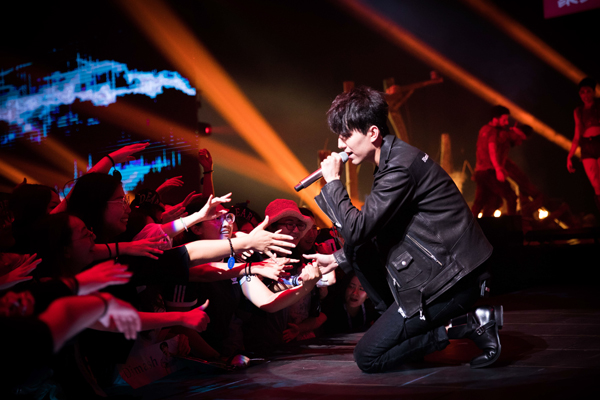 |
|
Kazakh singer Dimash Kudaibergen is among many musicians participating in the recent variety show Idol Hits, a program on iQiyi. [Photo provided to China Daily] |
By accident or design, thanks to these streaming platforms, 2018 has become a year of revival for music idols for various reasons. It has also witnessed an unprecedented battle for viewers among the three biggest operators in the internet arena.
For example, Cai became nationally known through Idol Producer, which piloted in January and finally created Nine Percent, an all-male band comprised of the nine winners of the reality show. Cai is the band's leader.
Maybe as a counterstrike, Tencent released an all-female counterpart, Produce 101, in April. The show not only created a new pop band, Rocket Girls 101, but also, somewhat inadvertently, made Wang Ju-who wasn't given much hope on the show because of her supposed unattractiveness-a cultural icon and a feminist heroine when she stood up to cyberbullies and those who criticized her, not for her singing, but for not living up to impossible feminine ideals. People connected with her sincerity and self-confidence.
Earlier this month, Tencent announced it will begin production of the program's second season, but this time the competitors will be replaced by male artists.
This boom in the genre may remind people of 2005's Super Girls and 2012's inaugural season of The Voice of China, arguably the pinnacle of the Chinese music-talent show on traditional TV. Nevertheless, it seems clear that the public appetite for such shows is well and truly whetted once more, and they have been away from our screens for too long.
"Without 'being true', a reality show will no longer have room to exist," Chen Wei, vice-president of iQiyi, says. "In a time when media is dominated by the internet, people call for new idols that have stronger individual characters.
"They are different from those stars catering for the orthodox aesthetics of TV," Chen, who was a producer of The Voice of China, says. "Therefore, we producers need to design storylines to enable participants to fully display their characters. And, with web-based shows, we can better adjust our formats according to viewers' feedback."
It is not only about revival. Online platforms also give some marginalized or even underground genres more chances to be heard.
For example, before The Rap of China, a reality show that aired on iQiyi in 2017, few people probably would have imagined how many phrases and slang words hip-hop would contribute to people's daily conversations over the course of a summer. The show attracted 3 billion online views within three months of its premiere.
Stylish street dancers also have opportunities to display their swagger on center stage thanks to shows like iQiyi's Hot Blood Dance Crew and Youku's Street Dance of China earlier this year.
"In the future, successful reality shows will likely propel the interests of a niche market into the public consciousness, rather than cater to the wider public taste in the first place," Yang Weidong, head of Youku, says. "New aesthetics, new knowledge and new storytelling skills are all needed to make a hit."